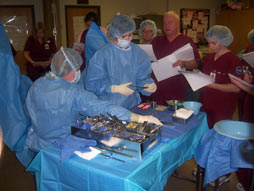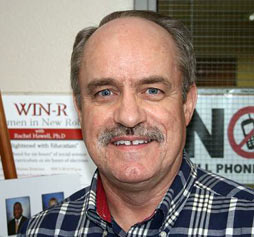By Sharon Murra-Kapon/reporter

One of the fastest growing allied health careers is surgical technology, and its demand is expected to grow as much as surgical procedures increase, according to the Bureau of Labor Statistics.
A surgical technologist is an allied health professional who is part of the medical team in the operating room.
JOB RESPONSIBILITIES
The tech is trained to assist the surgeon, anesthesiologist and registered nurses before and during surgery, providing a safe environment for the patient and team members, according to the Association of Surgical Technologists.
Technologists have knowledge of anatomy and physiology, medical terminology and instruments and tools used in different types of surgeries. They pass instruments and sutures to the surgeon without having to be told and protect all sterile items and fields from contamination that could result in infection of the surgical wound.
According to www.ast.org, honesty and integrity are the foundation of their decisions in their role in the operating room.
A surgical tech who is effective demonstrates attention to details, is flexible to changes, understands and performs teamwork, manages stress well, handles instruments quickly, lifts and moves patients and stands for long periods. Most importantly, the Web site said, surgical technologists provide the best medical care to all patients.
CERTIFIED TRAINING
Don’t look too far. TCC offers an 11-month surgical technology certification on NE Campus.
Don Braziel, coordinator, surgical technologist and instructor, recommends TCC’s program because it provides certification.
“We were the first CAAHEP [Commission of Accredited Allied Health Programs] accredited surgical technology program in Texas,” he said. “We have an excellent reputation in North Texas for turning out great techs and have been doing so since 1969.”
Admission to the program is limited and reserved for students with a 3.3 or higher grade point average.
Instructors of the program recommend students take required science courses such as anatomy and physiology, microbiology and some of the specialized courses like pharmacology and medical terminology before submitting their application to the health sciences department.
Doing so, they said, would give the students more time to concentrate only on the surgical technology courses and practices, which are intense.
JOB OPPORTUNITIES
Surgical techs are used in hospitals and day surgeries anywhere in the United States.
Others choose to work for private surgeons, in medical sales or in dental clinics.
According to the Surgical Technologist Association, the median annual income in 2004 was $34,010, with the median 50 percent earning $28,560 to $40,750.
Braziel said TCC’s students do not have trouble finding jobs, especially after they have taken the national certification exam at the end of the program.
“We have had an over 95 percent employment rate since 1969, and a lot of students have jobs before they graduate,” he said.
The application deadline is June 2.
All applicants should read the requirements in advance to ensure all paperwork is completed and accurate. Failure to do so may disqualify a student’s application.
Several vaccines are required (some of them are scheduled) and must be completed before students can go on the hospital practices.
Amy Worsham, a current surgical tech student, said she made sure to complete all pre-requisites and worked on her GPA.
“I knew the program was something I really wanted to do, but I had to prepare well before applying,” she said.
COMMUNITY OUTREACH
The surgical technologist students perform community service every fall and tell about the profession at the same time with the gLove Project.
The project is collecting winter gloves, mittens, hats and warm clothes for the less fortunate. The collection boxes are decorated with Christmas wrapping and are located through the NE Campus and several businesses in the area.
Cindy Mask, instructor in the program, said she chose the collection of gloves because surgical technologists are always gloved while working in the operating room—it links the service and the profession.
The collection bins will be out until Dec. 7, then the contents will be given to Safe Haven of Tarrant County to benefit children and battered women.
For more information, visit the health sciences department on NE Campus or call 817-515-6160. On the Web go to www.tccd.edu; click on NE Campus, Academic Div. and Dep., Health Sciences and Surgical Technology.


























